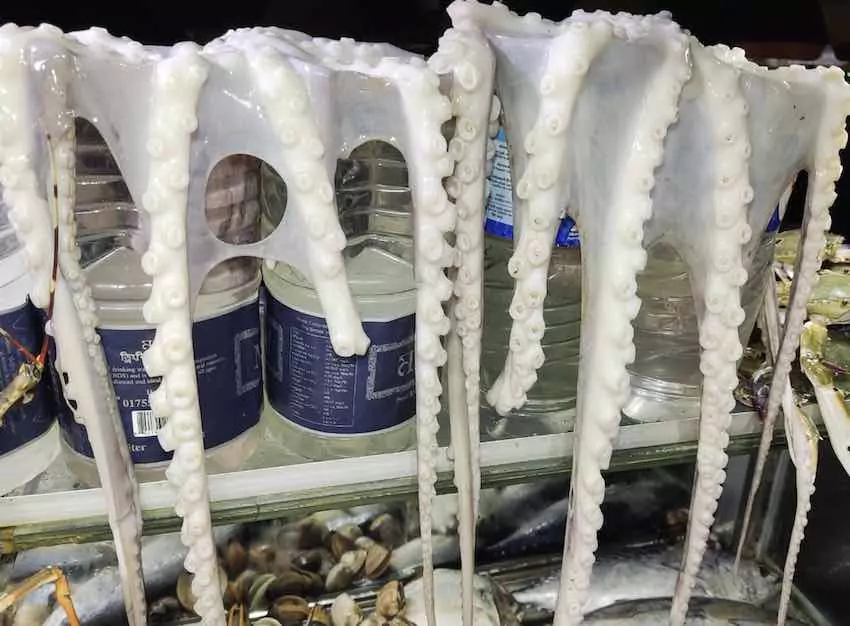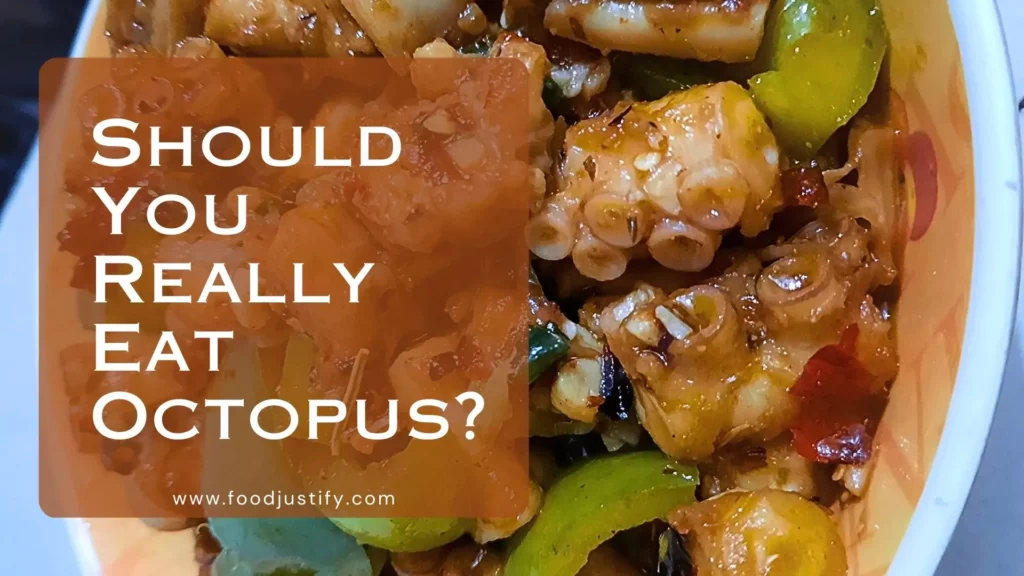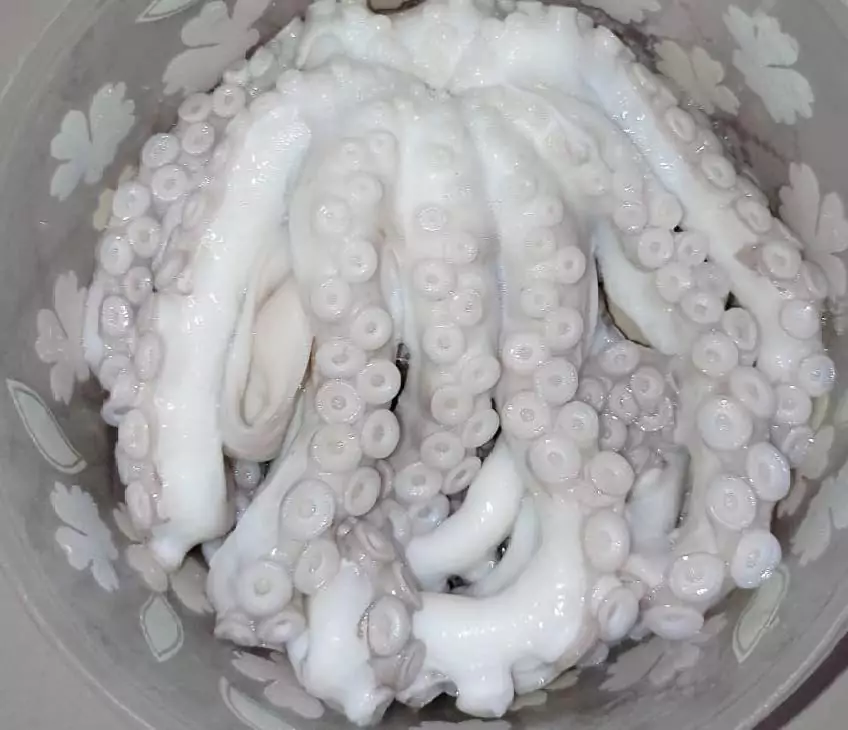Octopus is a fascinating creature that has been consumed as food for centuries. However, many still need to determine whether it is safe to eat and how it tastes.
This article will explore whether you can eat octopus and what it tastes like.
Can You Eat Octopus?
Yes, you can eat octopus, which is a popular seafood item in many cuisines worldwide. Octopus is a good source of protein and various nutrients, including vitamins and minerals like vitamin B12, iron, and selenium.
It is often prepared in various ways, including grilling, boiling, frying, or incorporating it into salads and pasta dishes.
The tenderness of octopus can vary depending on how it is cooked and prepared. It can be quite tender when cooked correctly, but overcooking can make it challenging and rubbery. Octopus is often marinated or tenderized before cooking to improve its texture.
If you want to try octopus, you can find it in seafood restaurants and markets. It’s a versatile ingredient that can be used in various culinary creations.
Just prepare it properly or enjoy it at a reputable restaurant known for its seafood dishes.
Benefits of Eating Octopus
Octopus is a low-fat, high-protein food rich in vitamins and minerals. A 3-ounce serving of octopus contains approximately 25 grams of protein, more than half of an adult’s recommended intake.
Octopus is also a good source of vitamin B12, essential for healthy nerve function, and iron, vital for producing red blood cells.
| Nutrient | Amount per 3-ounce serving |
|---|---|
| Protein | 25 grams |
| Vitamin B12 | 30% of daily value |
| Iron | 15% of daily value |
Potential Health Risks of Eating Octopus
While octopus is generally safe to eat, there are some potential health risks to be aware of. Octopus can contain high levels of mercury, which can be harmful if consumed in large quantities.

Pregnant women and young children are especially vulnerable to the effects of mercury. They should limit their intake of Octopus and other seafood.
Additionally, some people may be allergic to Octopus, which can cause symptoms such as hives, swelling, and difficulty breathing. If you experience these symptoms after eating Octopus, seek medical attention immediately.
Overall, Octopus is a nutritious and delicious seafood that can be enjoyed in various ways. As with any food, it’s essential to consume it in moderation and be aware of potential health risks.
What does Octopus taste like?
Taste
Octopus has a unique taste that can be described as a milder version of white chicken or pork meat, with a hint of the sea. The flavor can vary depending on how it is cooked and seasoned.
It can have a slightly charred and smoky taste when cooked on the grill. It can have a more delicate and subtle taste when boiled or steamed.
Texture
The texture of Octopus can also vary depending on how it is prepared. When cooked properly, it should be tender and slightly chewy. Overcooking can produce a rubbery texture, while undercooking can create a harsh and chewy texture.
The tentacles have a slightly firmer texture than the body, which is softer and more delicate.
Aroma
Octopus has a mild aroma similar to the smell of the sea. When cooked, it can have a slightly sweet and savory aroma pleasing to the senses.
If you’re new to eating Octopus, it’s recommended to try it in a restaurant or with an experienced cook to ensure it’s adequately prepared. Here are a few personal tips to enhance the flavor of Octopus:
- Marinate the Octopus in olive oil, lemon juice, and herbs before cooking to add flavor.
- Cook the Octopus with garlic and onions to add depth to the taste.
For more information on how to cook Octopus, check out this guide.
Serving Octopus

Presentation
Octopus is a unique and flavorful seafood that can be served in various ways. One of the most critical aspects of serving octopus is its presentation. Octopus can be served whole or sliced and can be arranged in a variety of visually appealing ways.
For example, octopuses can be arranged in a circular pattern or fanned on a plate. It can also be served on a bed of greens or other garnishes to add color and texture.
Accompaniments
Octopus can be served with a variety of accompaniments to enhance its flavor. Some popular accompaniments include:
- Lemon wedges: The acidity of the lemon helps balance the octopus’s richness.
- Garlic: Garlic complements the natural sweetness of the octopus and adds depth of flavor.
- Olive oil: Drizzling olive oil over the octopus adds richness and a smooth mouthfeel.
- Paprika: Paprika adds a smoky flavor and a vibrant color to the dish.
When serving octopus, it’s essential to remember that it has a mild flavor that can be easily overwhelmed by strong seasonings. Simple accompaniments like lemon and garlic are often the best way to highlight the natural flavor of the octopus.
Personal Tips
When cooking octopus, it’s essential to tenderize it first to ensure that it’s not harsh or chewy. One way to do this is to simmer the octopus in water with a few slices of lemon for about an hour before grilling or sautéing it.
Another tip is to marinate the octopus in olive oil, lemon juice, and garlic for a few hours before cooking to infuse it with flavor.
Preparing Octopus for Consumption

Cleaning and Gutting Octopus
Before cooking octopus, it’s important to clean and gut it properly. This will ensure that any remaining sand, grit, or ink sacs are removed. Here’s how to do it:
| Steps | Instructions |
|---|---|
| First Step | Rinse the octopus under cold running water to remove any excess slime. |
| Second Step | Remove the head and tentacles from the body by cutting just below the eyes. |
| Third step | Then remove the beak from the center of the tentacles by cutting around it. |
| Fourth step | Then remove the ink sacs, if present, by gently squeezing the head and tentacles over a sink or bowl. |
| Fifth step | Turn the head inside out and remove the beak and any remaining innards. |
| Sixth step | Rinse the head and tentacles thoroughly under cold running water to remove any remaining debris. |
Cooking Octopus
Octopus can be cooked in various ways, including boiling, grilling, and sautéing. Here’s a basic recipe for boiling octopus:
- Fill a large pot with enough salted water to cover the octopus.
- Bring the water to a boil and add the octopus.
- Reduce the heat to a simmer and cook the octopus for 45-60 minutes or until tender.
- Remove the octopus from the pot and let it cool before slicing or serving.
Popular Octopus Dishes
Octopus is a versatile ingredient used in many dishes across different cultures. Here are some popular octopus dishes:
| Dish | Country of Origin |
|---|---|
| Takoyaki | Japan |
| Pulpo a la Gallega | Spain |
| Octopus Salad | Greece |
| Grilled Octopus | Greece |
| Octopus Stew | Portugal |
In Japan, takoyaki is a popular street food made with diced octopus pieces and a simple egg batter. Pulpo a la Gallega is a traditional Spanish dish that consists of boiled octopus, paprika, and olive oil.
In Greece, octopus salad and grilled octopus are familiar dishes, often served with lemon and olive oil. In Portugal, octopus stew is a hearty dish with potatoes, onions, and tomatoes.
Sustainability and Ethics of Consuming Octopus
Octopus is a popular seafood, but whether it is sustainable and ethical to consume it is a topic of debate. Here are some key points to consider:
Pros
Cons
FAQ
Here are some frequently asked questions about eating octopus:
Yes, octopus is a good source of protein, vitamins, and minerals. It is low in fat and calories, making it a healthy choice for those watching their weight.
Octopus can be boiled, grilled, or fried. It is often used in dishes such as sushi, ceviche, and octopus salad.
Yes, you can eat raw octopus. However, it is important to note that there are risks associated with eating raw seafood, including the potential for foodborne illness.





Leave a Reply
You must be logged in to post a comment.